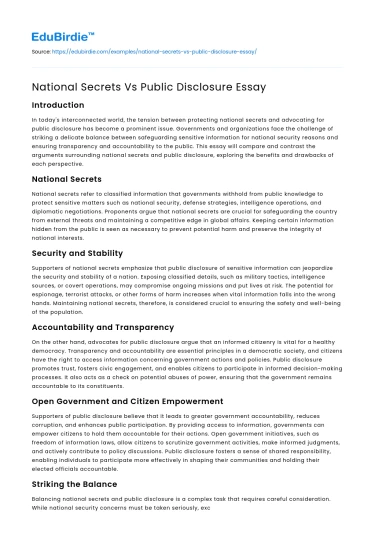Introduction
In today's interconnected world, the tension between protecting national secrets and advocating for public disclosure has become a prominent issue. Governments and organizations face the challenge of striking a delicate balance between safeguarding sensitive information for national security reasons and ensuring transparency and accountability to the public. This essay will compare and contrast the arguments surrounding national secrets and public disclosure, exploring the benefits and drawbacks of each perspective.
National Secrets
National secrets refer to classified information that governments withhold from public knowledge to protect sensitive matters such as national security, defense strategies, intelligence operations, and diplomatic negotiations. Proponents argue that national secrets are crucial for safeguarding the country from external threats and maintaining a competitive edge in global affairs. Keeping certain information hidden from the public is seen as necessary to prevent potential harm and preserve the integrity of national interests.
Save your time!
We can take care of your essay
- Proper editing and formatting
- Free revision, title page, and bibliography
- Flexible prices and money-back guarantee
Security and Stability
Supporters of national secrets emphasize that public disclosure of sensitive information can jeopardize the security and stability of a nation. Exposing classified details, such as military tactics, intelligence sources, or covert operations, may compromise ongoing missions and put lives at risk. The potential for espionage, terrorist attacks, or other forms of harm increases when vital information falls into the wrong hands. Maintaining national secrets, therefore, is considered crucial to ensuring the safety and well-being of the population.
Accountability and Transparency
On the other hand, advocates for public disclosure argue that an informed citizenry is vital for a healthy democracy. Transparency and accountability are essential principles in a democratic society, and citizens have the right to access information concerning government actions and policies. Public disclosure promotes trust, fosters civic engagement, and enables citizens to participate in informed decision-making processes. It also acts as a check on potential abuses of power, ensuring that the government remains accountable to its constituents.
Open Government and Citizen Empowerment
Supporters of public disclosure believe that it leads to greater government accountability, reduces corruption, and enhances public participation. By providing access to information, governments can empower citizens to hold them accountable for their actions. Open government initiatives, such as freedom of information laws, allow citizens to scrutinize government activities, make informed judgments, and actively contribute to policy discussions. Public disclosure fosters a sense of shared responsibility, enabling individuals to participate more effectively in shaping their communities and holding their elected officials accountable.
Striking the Balance
Balancing national secrets and public disclosure is a complex task that requires careful consideration. While national security concerns must be taken seriously, excessive secrecy can lead to a lack of trust in government and undermine democratic principles. Striking the right balance involves implementing robust security measures to protect sensitive information while ensuring transparency in areas where public disclosure is necessary for accountability and public interest.
Controlled Disclosure and Redaction
One approach to striking this balance is through controlled disclosure and redaction. Governments can establish processes and criteria for determining what information can be disclosed to the public, while also identifying sensitive areas that require protection. Redacting specific details, such as names or technical specifications, can help mitigate risks while still providing necessary transparency. This approach allows for accountability while minimizing potential harm to national security.
Conclusion
The debate between national secrets and public disclosure revolves around the tension between protecting national security and maintaining transparency and accountability. While national secrets are essential for safeguarding a nation's interests, public disclosure ensures informed citizenry, accountability, and active participation in democratic processes. Striking the right balance is a complex challenge, but through controlled disclosure and redaction, it is possible to protect sensitive information while upholding democratic principles. Finding common ground between security and transparency is crucial for building trust, fostering citizen empowerment, and maintaining a healthy democratic society.






 Stuck on your essay?
Stuck on your essay?

